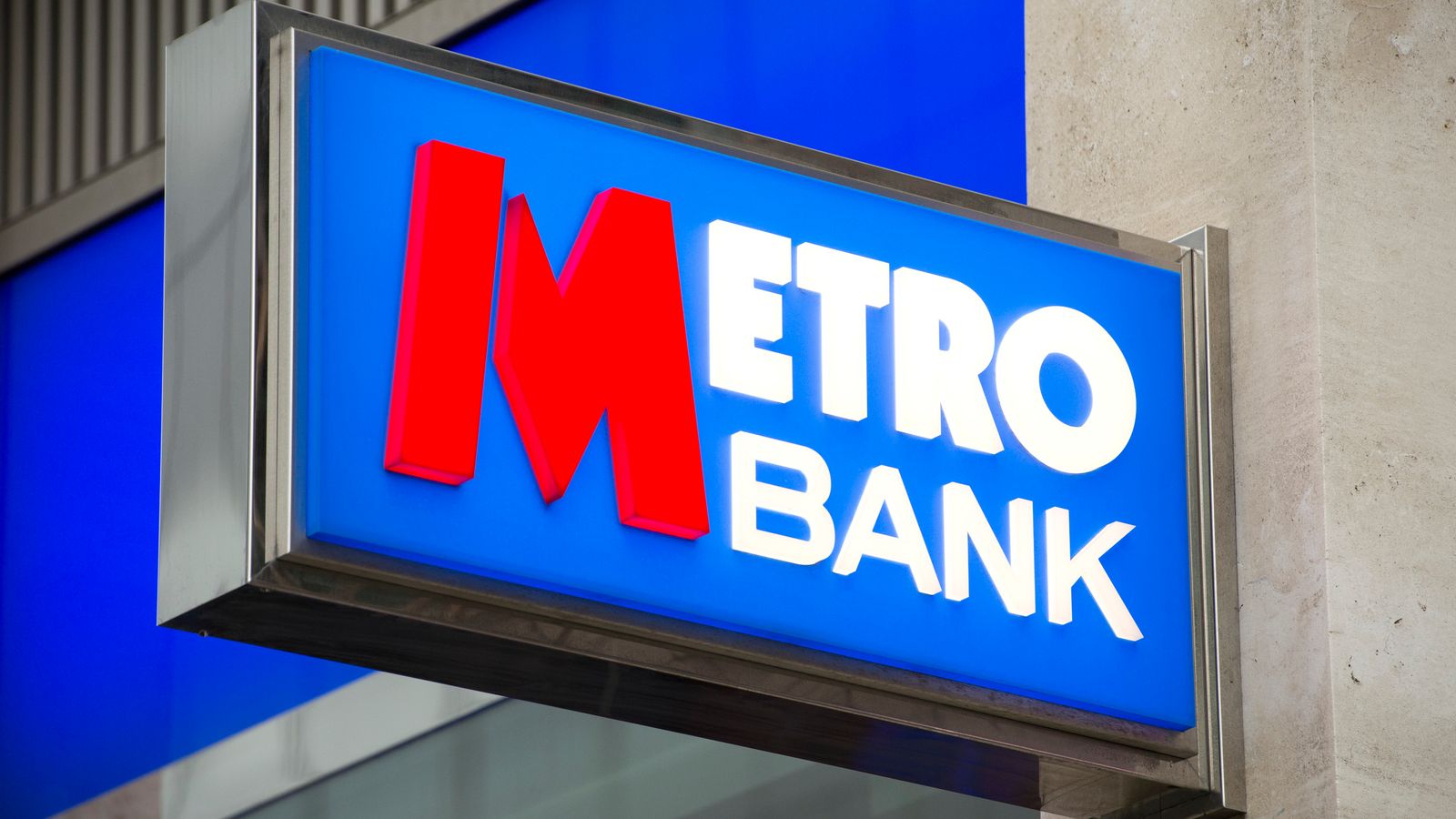The board of Metro Bank rejected a secret takeover approach last month from a rival British lender, just days before its share price crashed when it emerged that it was seeking hundreds of millions of pounds to shore up its finances.
Sky News can exclusively reveal that Shawbrook has tabled several bid proposals to Metro Bank, including one that was lodged as recently as the second half of September.
News of the approaches comes hours before a group of Metro Bank bondholders are expected to meet with the company’s bosses for talks about a financing package totalling more than £500m.
The objective of the talks is to agree a deal before the London stock market opens on Monday morning, according to insiders.
Analysts believe that Metro Bank will need to explore a sale of the company in case alternative proposals, such as a bondholder-led refinancing or a standalone capital-raising, were to fail.
This weekend, City sources said that Shawbrook’s recent overtures had been rebuffed by the high street retail bank.
It was unclear whether any live discussions were ongoing between the two companies, while the valuation of Shawbrook’s offers could not be established.
UK on course for biggest tax rise in 50 years after personal thresholds frozen, analysis suggests
The US saw a huge rise in new jobs last month. Why are the markets treating this like bad news?
Wetherspoons toasts first annual profits since pandemic
The proposals were not disclosed to the stock market by Metro Bank’s board.
The emergence of a credible buyer may raise questions about its directors’ decision not to engage in constructive talks given the company’s need to strengthen its balance sheet.
Shawbrook is also among a small number of banks vying to buy the Co-operative Bank, which is up for sale.
A Metro Bank spokeswoman declined to comment on the approaches from Shawbrook, which also declined to comment.
The so-called challenger bank endured a torrid week, with its share price crashing nearly 30% on Thursday in the wake of a Sky News report that it is working with investment bankers on asset disposals, the sale of new shares and the refinancing of a £350m bond due next year.
On Friday, the stock rallied 20% to close at 45.25p, giving it a market capitalisation of less than £80m.
Metro Bank, which is being advised by Morgan Stanley, Moelis and Royal Bank of Canada, has been planning to raise at least £100m from a share sale, although the viability of that plan is doubtful given the scale of its share price collapse.
At one point in 2018, the lender – which promised to revolutionise retail banking when it opened its first branch in London in 2010 – had a market capitalisation of £3.5bn.
Further details of the proposals from bondholders, who are being advised by PJT Partners, were unclear on Saturday.
One source described the situation as “fluid” but confirmed that talks were scheduled to take place on Saturday, potentially lasting all weekend.
Shawbrook’s most recent approach to Metro Bank is said to have come more than a week after the latter disclosed to the stock market that Britain’s banking regulator had rejected its application to switch to a capital-light model that would have provided significant balance sheet headroom.
Its shares halved in the weeks following that announcement, prompting Mr Sharpe and Dan Frumkin, chief executive, to draw up a new capital-raising plan.
On Thursday, Sky News revealed that Metro Bank had approached high street rivals including Lloyds Banking Group and NatWest Group about selling a £3bn chunk of its mortgage book.
Metro Bank became the first new lender to open on Britain’s high streets in over 100 years when it launched in 2010, soon after the last financial crisis.
It has 2.7m customer accounts, making it one of the ten largest banks in Britain, and offers current accounts, business accounts, personal loans and insurance products.
The company employs about 4,000 people, operating from about 75 branches across the country.
Banking regulators and the Treasury are closely monitoring Metro Bank’s capital-raising plans for any sign of increased deposit withdrawals.
Rumours have circulated for years about its finances.
In 2019, customers formed sizeable queues at some of its branches after suggestions circulated on social media that it was in financial distress.
Days later, it unveiled a £350m share placing in a move designed to allay such concerns.
Metro Bank has had a chequered history with City regulators, despite its relatively brief existence.
Last December, it was fined £10m by the Financial Conduct Authority for publishing incorrect information to investors, while the PRA slapped it with a £5.4m penalty for similar infringements a year earlier.
The lender was founded in 2009 by Anthony Thompson, a financial services entrepreneur, and Vernon Hill, an American who eventually left in controversial circumstances in 2019.
Metro Bank has been forced to sell assets in the past, announcing a deal in December 2020 to sell a portfolio of owner-occupied residential mortgages to NatWest Group for up to £3.1bn.






















